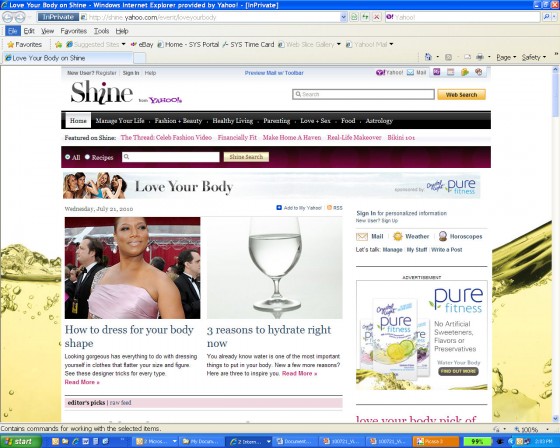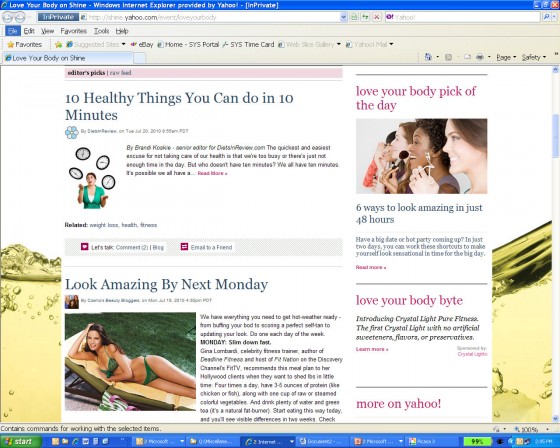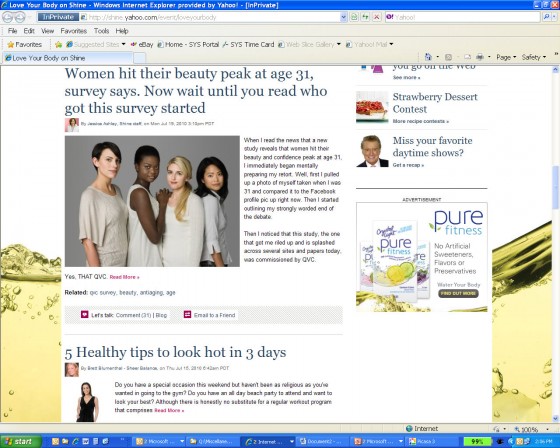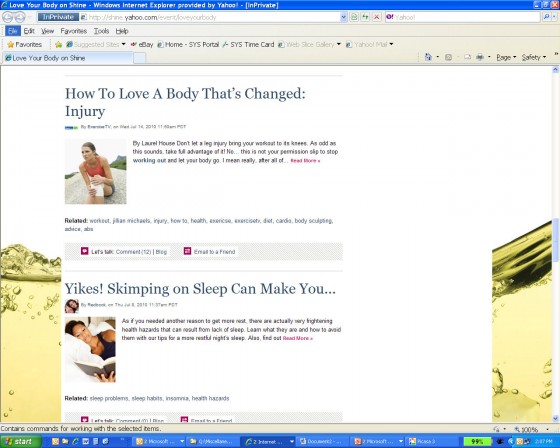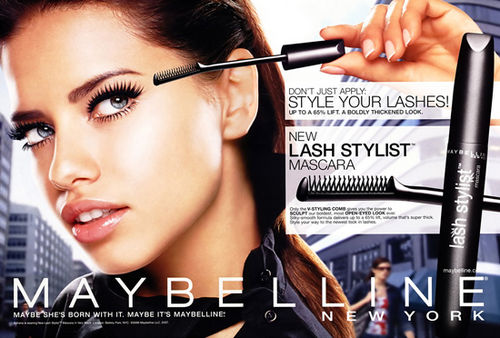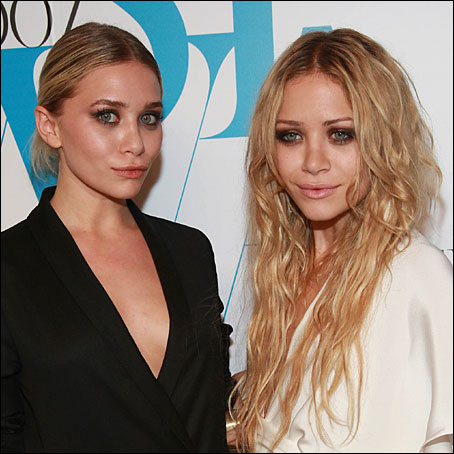Next time you fell a little insecure about your looks, remember this ...
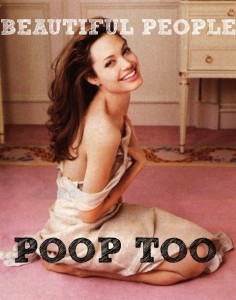
Next time you fell a little insecure about your looks, remember this ...

Resistance to losing weight is generally not about laziness, lack of willpower, or love of food. The weight is just a symptom of what's going on underneath ...
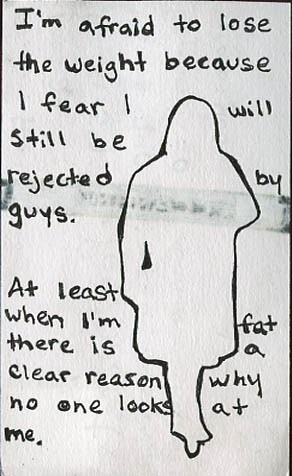
"You are working with a fat girl. Know it now and get over it. ... They need a reminder sometimes that I don't belong to them. It's my body. ... My body can't put anyone in jeopardy of not making money anymore. My body is just not on the table that way anymore."
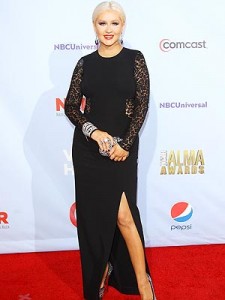
In this emotionally powerful project, Julia Kozerski uses her photography skills to capture her "... private struggles with food, obsession, self-control, and self-image."
"We are flooded with media messages and images about losing weight: PSA campaigns, sneaker ads, reality shows, before and after commercials, in which celebs beam with joy in photos proving that they've slimmed down. They're often perfectly toned, in a bikini, grinning ear to ear.
"Julia Kozerski's artwork is very, very different. She faces the camera not with a smile, but with a steady, open, challenging gaze. Sometimes there are tears in her eyes. Sometimes she doesn't face the camera at all. ... "We're not accustomed to seeing documentation of this sort: A woman's body photographed not for the male gaze, not Photoshopped and airbrushed and rendered perfect so as to be more easily digested by the public."
Apparently, you can be too thin in the fashion world, but it isn't a matter of health. It has more to do with the aesthetics of showing lots of skin with a tad too much rib.
"[The magazine] Numéro, it seems, liked that [top model Karlie] Kloss was so thin but hated that her thinness made her bones more apparent. So in a have-your-cake kind of gesture, it made the bones disappear with Photoshop. ... We've become conditioned to expect perfected images of skinny, apparently boneless, smooth little girls in our magazines. In a certain way, we've come to rely on Photoshop to insulate us from the sharp reality of what maintaining an industry-approved fighting weight can do to a human body."
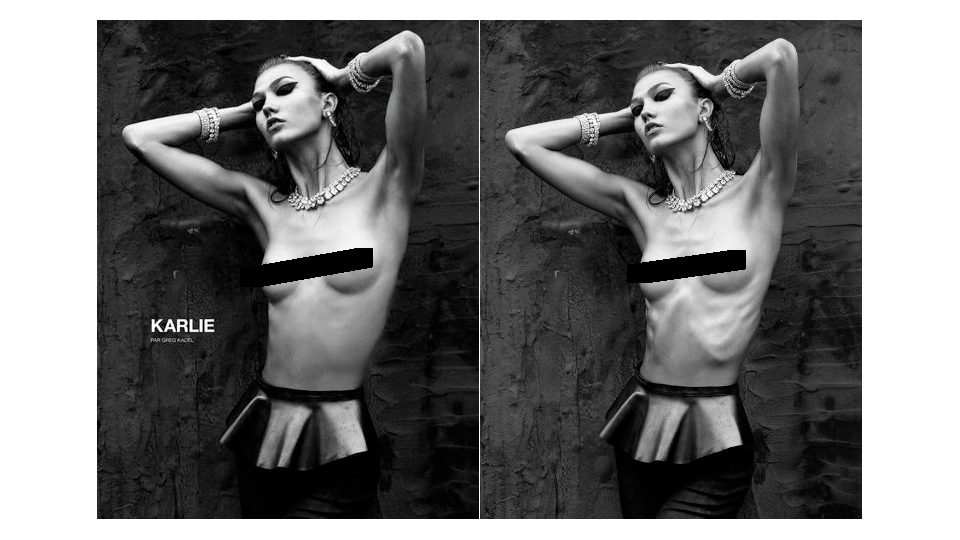

The media's treatment of women as sex objects is a ubiquitous fact of life. Advertisements, fashion spreads, comic books, movie posters -- nearly everywhere you look, women are shown in various stages of undress and posed in positions that make them look vulnerable, submissive, and sexually available. Conversely, men are depicted in positions of power or dominance, e.g., standing while a woman is reclining, being fully clothed while she's undressed, etc. These differences reinforce inequality between the sexes. Really, how powerful can a woman feel when she's half-naked and awkwardly contorted?
It's an interesting social experiment to see what happens when men are placed in these typical "female" poses.
The image below features two Vanity Fair covers: the top one with fully-clothed fashion designer Tom Ford, along with a nude Keira Knightley and Scarlett Johansson; and the bottom one is a Vanity Fair spoof of their own cover with a fully-clothed Paul Rudd and a pretend-nude Seth Rogen, Jonah Hill, and Jason Segel. In a separate issue, Vanity Fair also did a photo spread with comedians Kristen Wiig, Maya Rudolph, and Tina Fey, but posed them as typical sex objects. As Entertainment Weekly asks, would it be "... just as uproarious if some of those ladies vamped ironically in body stockings[?] ... Men being objectified is so silly as to be hilarious, but it’s better if funny women are also hot."
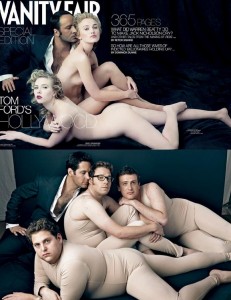
Here's a similar set of images showing nude female models huddled together and then one with the guys from the "Jackass" TV series and movies: 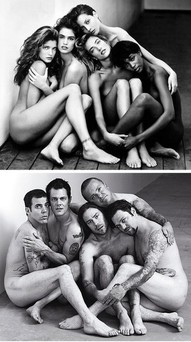
The following "men-ups" were created by photographer Rion Sabean to parody classic pin-up poses. According to Rion, his work focuses on "... gender and sexuality, wherein I attempt to bring light to the scrutiny and judgments of a society that defines human beings under rigid, antiquated terms."
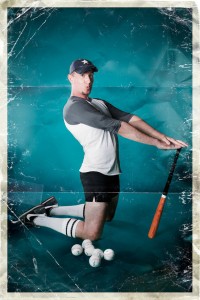

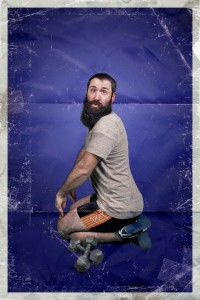
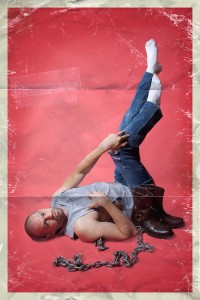
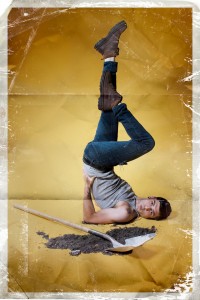
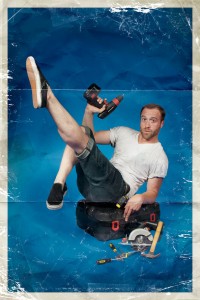
Artist Paul Richmond created a similar series from a gay male perspective. "I began the Cheesecake Boys series to rectify the inequalities in the underwear-flashing art genre known as pin-up," said Richmond.
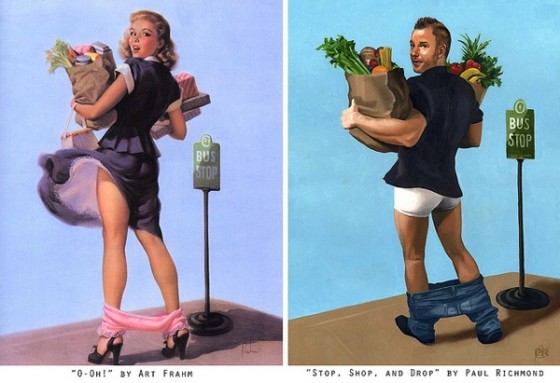
Here's Richmond explaining how he came up with the concept, along with more examples of his work:
Fantasy author Jim Hines parodied women's poses on the covers of fantasy novels by trying to replicate the poses himself. (He also did a series posing like the men on romance novel covers). "... [M]ost of these covers are supposed to convey strong, sexy heroines, but these are not poses that suggest strength. You can’t fight from these stances. I could barely even walk," said Hines.
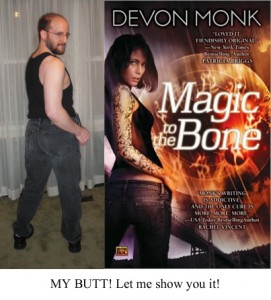
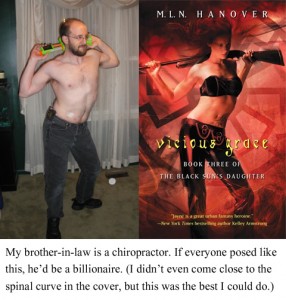
The following is an excerpt from the upcoming book -- If Beauty Is inside, Why Do We Hate Our Guts?: Pop Culture, Sexism, & Body Image. Read the first chapter here.
It's time to declare independence, to separate ourselves from the bad habits, the stifling expectations, and the negative messages that no longer serve us (assuming they ever did).
It's time to declare independence from media messages that tell us we're ugly if we don't look like the "flawless" images of celebrities on the screen and in the magazines. It's time to stop buying into the manipulation and stop wasting time trying to chase an illusion that doesn't even exist.
It's time to declare independence from the belief that having the perfect body will make us worthy of love and respect. We're already worthy of love and respect in the bodies we have now -- no amount of weight loss or plastic surgery will increase our value.
It's time to declare independence from dieting, from deprivation, from seeing food as the enemy. The American weight loss industry makes nearly $60 billion a year trying to convince us that we're not good enough -- if diets worked, would they be this profitable? It's time to stop contributing to their false sense of hope.
It's time to declare independence from body loathing, from looking at our bodies with disgust instead of love. It's time to appreciate all of the amazing things they do for us -- the jiggly arms that give great hugs, the flabby thighs that carry us through the park, the droopy breasts that fed a child, the wounded heart that still knows how to love, the exhausted brain that still manages to tell our lungs to breathe.
It's time to declare independence from spending so much time, energy, and money trying to fit into someone else's idea of whom we should be. It's time to put ourselves first, to focus on our own desires and do what we want instead of what's expected of us. It's time to trust our instincts and become someone we're proud of.
It's time to declare independence from shame, from the belief that we're not good enough, not beautiful enough, not thin enough, not smart enough, not clever enough, not sexy enough. It's time to declare that we are already enough -- that we are perfectly imperfect exactly as we are.
It's time to declare independence from the oppressive labels of virgin or whore, straight or gay. Our sexuality does not define us. It can't possibly define what kind of person we are or what's in our hearts or our minds. Any attempt by others to claim otherwise is an attempt to control us, to police our behavior, and to shame us so that they don't have to examine their own ignorance and fear.
It's time to declare independence from the belief that we can bring sexual assault upon ourselves based on how provocatively we're dressed, how flirty we act, or how drunk we get. The only person responsible for a rapist's behavior is the rapist himself. We have a right to feel safe in the world.
It's time to declare independence from legislators who think the female body should be controlled by wealthy, middle-aged, white, conservative men. Our bodies belong to us -- it's time to declare our freedom to make our own decisions about them. Because if we cannot, then we are truly not equal citizens and this country as not as free it claims to be.
It's time to declare our independence from any force that tries to hold us down -- especially those forces that limit us from within.
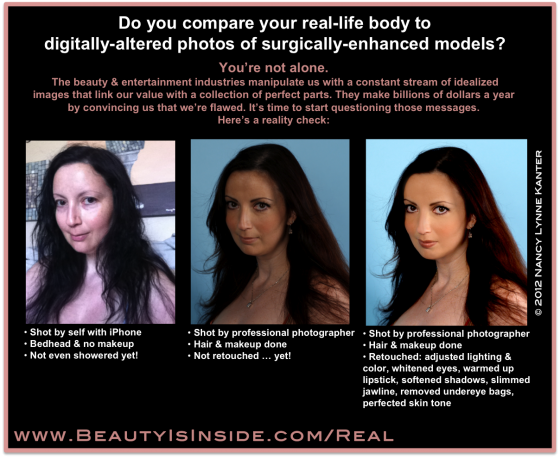
This is me. Don't think for one second that posting a picture of myself with dirty hair, no makeup, and in unflattering lighting didn't take some ovaries! Like many women, I've struggled with not feeling pretty enough, thin enough, perfect enough. I'll be the first to admit that I think I look the best in the photo on the right. It's the photo I use on the back of my book and on the About Me page of this website. I am definitely a product of our beauty-obsessed culture. But this is also me sacrificing my vanity for the greater good. How can I talk about body acceptance and the need to fight against sexist and oppressive imagery if I'm not being real with myself? It takes courage to be real. So everyone, this is what I look like in the morning. Deal with it.
The media manufacture female insecurity for profit. They invent flaws in our appearance and pressure us to fix them. They segment the female body as if it were a bucket of chicken -- we're just legs and breasts and thighs. They convince us that our bodies are too meaty and fatty, our skin is too greasy, and our hair is too fried. They manipulate us with idealized images of hot chicks who were perfected by plastic surgeons, injectable facial fillers and paralyzers, professional photographers, makeup artists, special lighting, hair stylists, fashion designers, and finally photoshopping. And then we compare our real selves with this illusion. It's not a fair fight.
A woman's appearance is always treated as relevant. Tabloids critique female celebrities for gaining weight or having the "worst beach body". The Playmate of the Year is featured on the evening news. Political commentators assess female candidates' appearance almost as much as their political beliefs. We're trained to think that our sexuality is our primary source of power. I discuss this in my upcoming book, If Beauty Is Inside, Why Do We Hate Our Guts?: Pop Culture, Sexism, & Power. In the recent documentary Miss Representation, the filmmaker also examines how our culture's sexualization of women actually minimizes our power in society. Just think about it -- if the most powerful women in the country are reduced to their looks, how can any of us expect to be treated with respect?
It starts with respecting ourselves and having the courage to be real. We have to stop allowing the media to define us in such a superficial and demeaning way. When we pull back the curtain, we see that the sculpted and perfected illusion is just a real woman who has more in common with us than we think.
I wasn't exactly excited to share my naked face with the Internet, but I put together the above image so that you could see the reality behind the special effects. I'd love to see models and celebrities do the same, but their careers depend on them maintaining the illusion. So for now, maybe it'll just be up to us regular women. And that brings us to Beauty Is Inside's new "Courage to be Real" Campaign!
The "Courage to be Real" Campaign is about cracking the illusion of perfection that makes us hate our bodies and compete with each other. I challenge you to be courageous and send in "before and after" photos of yourselves, along with what was manipulated in the "after" photo. Send your photos to real@beautyisinside.com. I'll collect them all in a photo gallery on this site, and I'll also post them on the Beauty Is Inside Facebook page and on Twitter @_BeautyIsInside.
Come on -- if I did it, so can you! Together, we can inspire other women and girls to have the courage to be real themselves.
I'm pleased to announce my new "ad campaign" -- introducing the "Purple Paper Project"! For this project, I'll be critiquing offensive advertising messages with the help of little purple papers and a little snark. Each new ad will be posted here on my blog, and I'll compile them together in the "Purple Paper Project" tab in the right sidebar.
We see about 3000 advertising messages everyday. Even when we're not paying attention, they're always in the background. Cumulatively, these messages affect how we feel about ourselves. In so many ways, they tell us we're too fat, our skin looks like crap, and our house is a mess. They teach us what society expects of us -- and how we're not measuring up. They play on our insecurities, and even invent new ones for us to obsess over (cankles, anyone?). But don't worry, because they're sure to have a product or service that can fix our "flaws"! How very convenient!
The more I started paying attention to these messages, the more I realized how manipulative, insulting, and sexist they were. And I also realized that I was buying right into them. Maybe I did need to lose weight, improve my skin, and clean my house more thoroughly.
Or maybe my weight, skin, and house were just fine the way they were.
Advertising is a one-way form of communication in which powerful corporations try to persuade us to spend our money by manipulating our insecurity. The "Purple Paper Project" is about turning this into a two-way conversation. Consumers have powerful voices too, and it's about time that we started talking back.
To kick this project off, here's an ad from Viva paper towels:
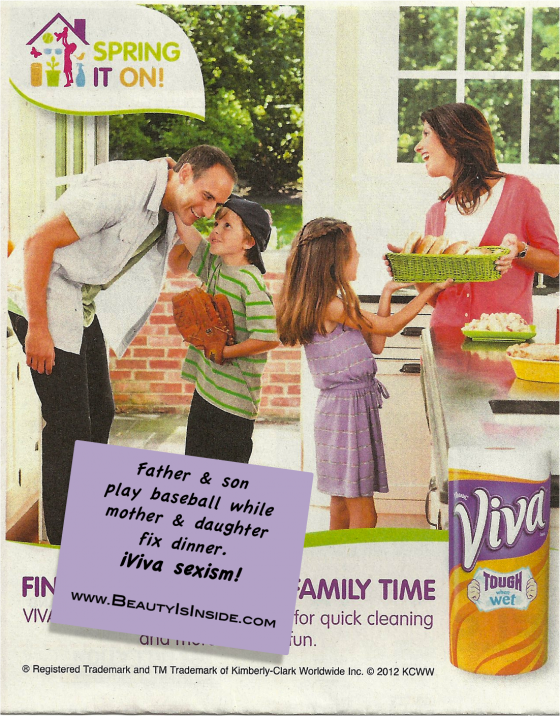
I recently posted an article about the image below, which is currently circulating around the Internet. As I mentioned in the previous post, this faux-empowerment message just ends up pitting thin girls against curvy girls, feeding the comparisons and competitions, and separating us all. As a result, we fight against each other instead of fighting against the beauty pressures that make us feel insecure in the first place. Here's the original image:
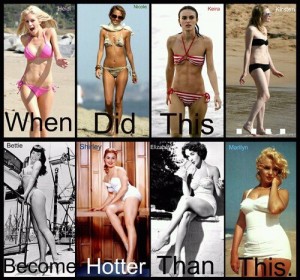
What's the next logical step?
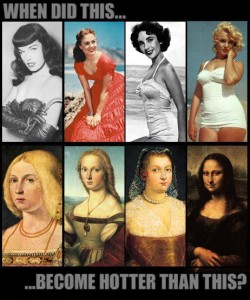
and then what about this?
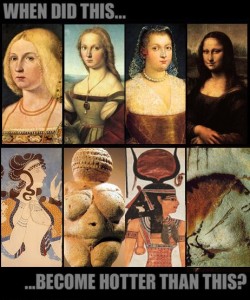
Haven't we all had enough? Isn't it about time that we move past the pettiness and start working together?
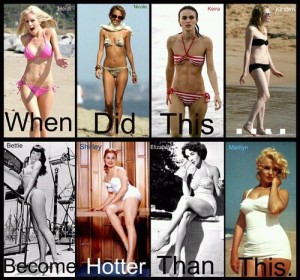
The other day, my friend shared this image on my Facebook wall. I'm sure she had good intentions, as did the creator. At first glance, it seems like a girl-power-feel-good-kind-of-message that challenges the pressure to be thin, similar to the "real women have curves" mantra made popular by the movie of the same name. It seems to be about women celebrating their curves, accepting their bodies, and not buying into the extreme dieting mentality.
But it's not. This image is about shaming thin women about their bodies under the guise of empowering heavier women. It's just the other side of the same coin.
What about women who are naturally thin? Or naturally not as curvy? Are they less hot? Are they not real women? Comparing is just one more way for us to separate ourselves.
Most of us struggle with our weight, so being in the public eye would most assuredly have an impact on how celebrities feel about their own bodies. Heidi Montag had 10 plastic surgeries so that she could look hot enough. Tabloid rumors have accused Nichole Ritchie and Keira Knightley of having eating disorders, and Kirsten Dunst was on the cover of Star Magazine for having one of the "worst beach bodies," so it's not as if any of them are being celebrated for their bodies at the moment. The media's pretty arbitrary anyway about what constitutes the hot-kind-of-thin vs. the anorexic-kind-of-thin. It's a fine line, and those celebrities who cross it are publicly shamed on tabloid covers. I'm sure Bettie, Shirley, Elizabeth, and Marilyn faced their share of scrutiny and pressure as well based upon the beauty standards of their time. Elizabeth Taylor, for one, suffered from both eating disorders and substance abuse. Considered by many to be the most beautiful woman in the world, she was once quoted as saying, "I don't like my voice. I don't like the way I look. I don't like the way I move. I don't like the way I act. I mean, period. So, you know, I don't like myself."
Beauty is subjective. Others' opinions about us are irrelevant -- what matters most is how we see ourselves.
The body snarking, the gossipy headlines about who has anorexia or who's getting fat, the who's hotter comparisons -- these all promote the age-old competition to determine the fairest of them all. And eating disorders are part of this futile attempt to fit what society deems "hot".
There's value in simply being who we are, whether we're thin or fat or have curves or not. So, in response to the question: "When did this become hotter than this?", here's another question: Why do we have to cut someone else down to feel better about ourselves?
The media teach us
that our primary goals as women
should be weight loss and the pursuit of beauty,
and this is particularly true of celebrities.
--
Maybe it's time for us all to stop chasing pavements
in that direction
and instead,
start rolling in the deeper goals.
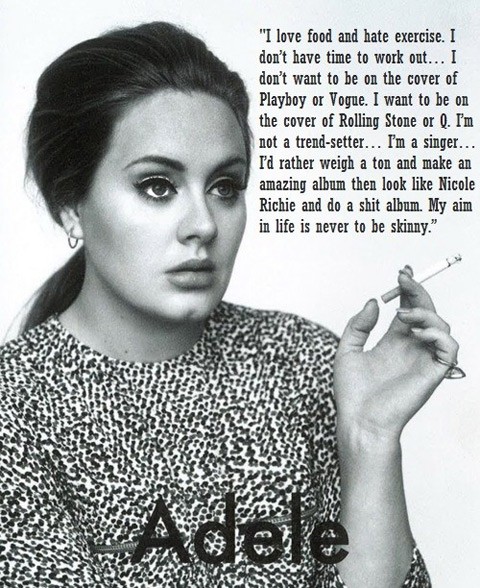
In a recent study, researchers found that 100% of women felt bad about their appearance after looking at beauty magazines for just a few minutes. From one of the authors: “Surprisingly, we found that weight was not a factor. Viewing these pictures was just bad for everyone,” said Laurie Mintz, associate professor of education, school and counseling psychology in the MU College of Education. “It had been thought that women who are heavier feel worse than a thinner woman after viewing pictures of the thin ideal in the mass media. The study results do not support that theory."
I happened upon this brilliant way of fighting back. This was part of a campaign by the National Eating Disorder Information Centre (NEDIC) in Canada that targeted beauty magazines. From NEDIC's website: "To involve the public in our campaign, this transit shelter ad appeals to dieters and those who feel the pressure to diet (virtually all women), empowering them with a way to really shed their weight problem."
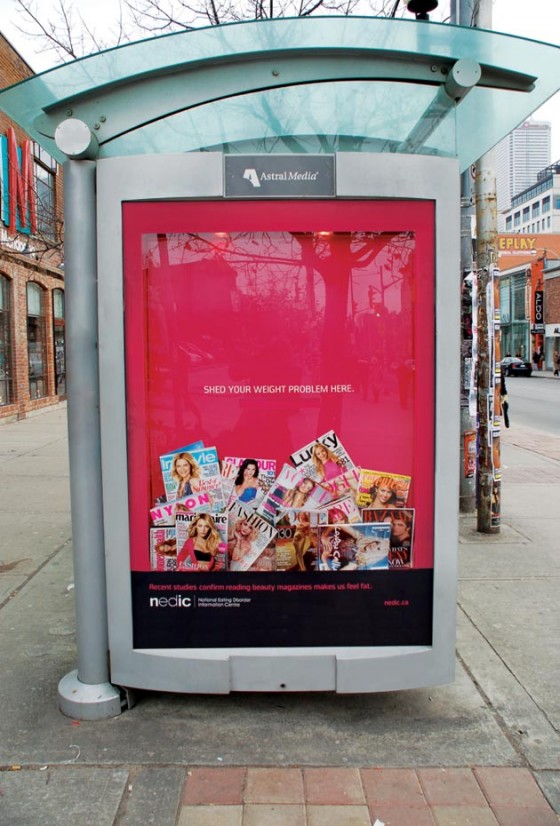
Close-up:
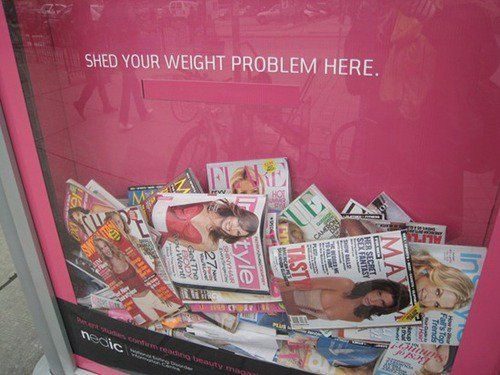
Text at bottom of display:
"Recent studies confirm reading beauty magazines makes us feel fat."
Another study demonstrated "... the role of the media in shaping, rather than merely reflecting, societal perceptions of the female body. Consistent with our hypothesis, it was found that women's body image satisfaction is, indeed, influenced by their exposure to the thin ideal presented in fashion magazines."
(Want more? Here's one of my previous posts on this topic.)
June's issue of Vogue Italia (NSFW due to some nudity) offered a refreshing break from the typical images of female perfection plastered over every fashion and beauty magazine. This issue, entitled Belle Vere or "True Beauty," featured "plus-size" models both on the cover and in a photo spread. As is the case in the media, plus-size means average-size in real life. I don't know the statistics in Italy, but the average American woman is 5’4” and weighs 165 pounds. A woman this size would most certainly be plus-size in the modeling world, and it would be quite uncommon for a magazine to have her gracing its cover, at least in the United States.
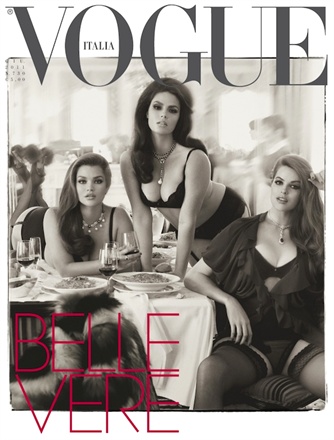
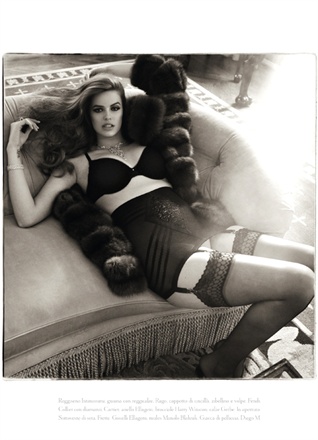
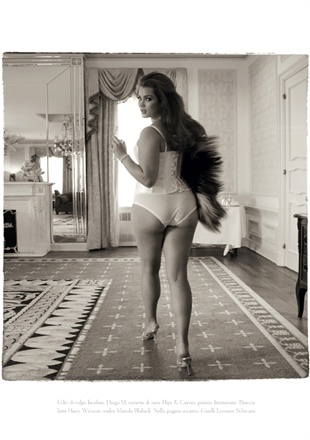
In a previous post, I discussed how the media create arbitrary flaws in women's bodies, then conveniently offer up solutions to fix those flaws. That post was about ugly armpits. Today's example is about the land down under -- and I don't mean Australia. (I've also written about this flawed area before.) Yesterday, Jezebel posted a clip from the CBS daytime show, "The Doctors," in which they discuss how "Your Aging, Deflated Vagina Is Like A Hamburger." (Well technically, it's your aging, deflated vulva, but let's move on.)
On the show, Dr. Jennifer Berman, expert in the field of female urology and sexual medicine, made her case by explaining how your private parts become less puffy as they succumb to gravity, age, and having babies, and this makes them sag and deflate. She used a hamburger as a pretend vulva. (I guess a taco would've been too tacky.) She held the burger sideways so that the meat patties represented the inner labia minora and the buns were the outer labia majora -- the parts that don't puff enough. (Side note to show producers: On the next show, you could totally add different condiments to the burger in order to discuss a variety of vaginal maladies, e.g., cheese, mayo, ketchup, etc. Just a thought.)
Dr. Berman explained that a procedure called the "Labial Puff" can counteract the sagging and deflating. It entails injecting the outer lips with cosmetic filler, similar to the injections done to the lips on your face. It allegedly helps to revolumize the labia majora -- or in other words -- it puffs your muff.
"Ladies, you're not going to notice it if you're just laying down or sitting down. I actually had to bend over and look under and I swear to God, I almost had a heart attack [insert audience laughter]. And it was subtle, but it was there," she said.
So, let's get this straight. This alleged labial malformation isn't noticeable unless you're bending over and looking under yourself in some sort of mangled yoga pose, right? And not only that, but while you're contorting yourself to search for your most recently discovered fucked up body part, you discover that it's only subtly fucked up? It doesn't hurt or interfere with your sexual function, but it supposedly looks subtly fucked up according to those who have an interest in fixing it. And that alone is a good reason to perform a cosmetic procedure on it? That's what I think is fucked up.
And that, boys and girls, is an example of how the media invent an arbitrary flaw in the female body to create a need, and then serve up a solution to fulfill that need.
The Labial Puff is supposed to make your vulva look more youthful ... some would say even childlike. So here's a question: what about the guys? When boys go through puberty, their testicles drop, and they continue their downward descent as men age. Why don't we hear "The Doctors" make a case for the Sack Lift to make men look more youthful? Like the Labial Puff, it could be just a simple outpatient procedure in which they inject cosmetic fillers to pump up the testicular volume. Then they could do a couple of little snips and stitches to raise them up to a more youthful -- and virile state.
The best part? "The Doctors" could explain the procedure on their show by using a couple of meatballs.
It's quite rare for advertising to celebrate women's extra curves. Sure, Dove's "Campaign for Real Beauty" uses a variety of women in their ads to show that different bodies can be beautiful. But as I mentioned in a previous post, their parent company, Unilever, contradicts itself with sexist Axe ads geared toward men. Olay's recent slogan was "Love the skin you're in," but their ads still photoshopped all of the pores, age spots, wrinkles, cellulite, and zits out of the skin their models were in.
In 1997, The Body Shop launched an ad campaign with the image below to inspire women to accept their bodies. I remember being excited as the store even handed out stickers with this image. Unfortunately, the ad soon disappeared after Mattel threatened to sue over the unauthorized use of Barbie's likeness. Unlike most companies that sell beauty products, The Body Shop hasn't relied on idealized images of women to sell their face creams, body butters, and lip gloss. They have a history of being a socially responsible company that supports humanitarian and environmental causes. Their ad was a refreshing break from all of the other media messages that pressure women to look perfect.
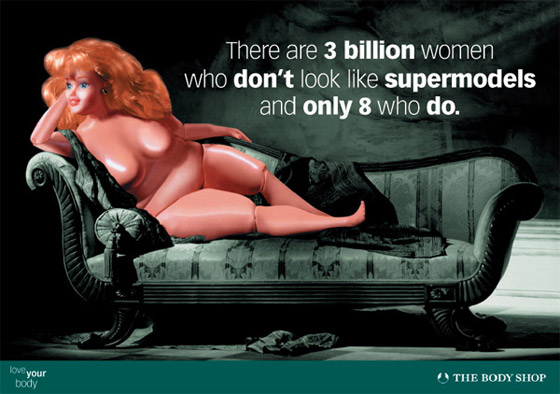
Tall, striking
Perfectly thin
Elegant
Ideal.
Sexy, child-size clothing
Barely covers
Breasts
Disproportionate to
Fat-free thighs
And soft, gentle curves
Of ribs, prominently displayed.
Beautiful, thick hair
Glued at the scalp
Frames a flawless face
Etched in fine marble
Expressionless, void
Of unappealing character lines.
Teeth capped in pearls
To hide bile's erosion.
Twenty years old --
Over the hill in five more.
She is who we
Aspire to be.
She is beauty.
Introducing Skinny Hangers!
Because you can never be too skinny --
and apparently, neither can your hangers.
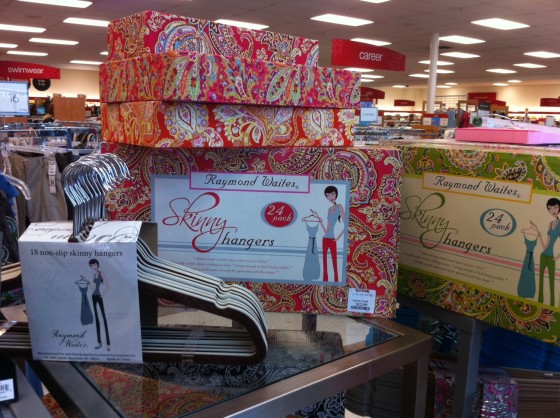
Just make sure to avoid this kind,
no matter how skinny they are:
We often measure our success as women in numbers -- judging ourselves in terms of pounds, size, and age. Lower numbers indicate success, while higher equal failure. And as such, we’ve developed a counter-intuitive association between losing and gaining. In our worlds, losing equals success and gaining equals failure.
We focus on losing weight, lowering our sizes, taking years off our faces. But consider for a moment how refreshing it would feel to focus on losing the following instead:
insecurity
anxiety/depression
self-critical voice
hopelessness
judging ourselves from the outside in
And instead of worrying about gaining weight, going up in size, or showing years on our faces, how great would it be if we could gain these?:
confidence passion intuitive knowledge joyfulness/hopefulness experiencing ourselves from the inside out
Our culture has taught us the convoluted notion that losing superficial aspects of ourselves like weight will lead to positive internal states like happiness. But then there always seems to be one more step to take, one more improvement to make, one more product to buy. That carrot is continually dangled farther and farther away, making us feel like failures, and drawing us toward that extra slice of carrot cake for temporary relief. This cycle may be self-defeating to us, but it also helps the beauty and diet industries gain billions of dollars in revenue, while losing nothing.
Maybe it’s time to reexamine what losing and gaining really mean.
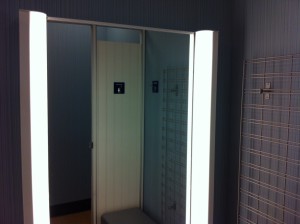
Dressing rooms are claustrophobic stalls of despair and self-loathing. They're places where you gasp "Holy shit!" after catching a glimpse of your ass in the fluorescent-lit three-way funhouse mirror. Given that environment, it's amazing that we're ever fortunate enough to find one article of clothing that doesn't make us feel lumpy, dumpy, and frumpy.
Dressing rooms are places where size-2 teenage girls complain to their friends that every pair of jeans makes them look fat. They're places where women yank the dreaded light-washed, high-waisted mom jeans over the child-bearing hips that once gave birth to those teenage girls.
Even those of us who love shopping for clothes don't always love trying them on. When the saleswoman asks me over the latched door, "Do you need a different size?", sometimes the only thing I hear is, "Do you need different thighs?"
Why yes, yes I do, thank you. And while you're checking the racks, can you also see if your store carries any self-confidence? It seems I'm running a little low.
We do have moments of hope in dressing rooms though. We hope that we'll fit into the clothes that hot girls fit into. We hope that black is indeed slimming. We hope that we'll look pretty. Or we just hope that the shapeless sweater will make us disappear into the background.
How many of us have heard a woman in a dressing room evaluate her reflection and then proclaim that she looks damn good? How many of us have uttered these elusive words? Not enough -- and that's a damn shame. What's worse is that we'll often leave those dressing rooms deflated and defeated, hoping that our new leather handbags will distract us from feeling like the cows they were made of. It's depressing how much power we give to a mirror or a jean size.
Unflattering mirrors and lighting draw our already critical eyes to our "trouble areas," but consider for a moment that maybe our true trouble area is not found in the mirror at all.
Maybe it's in not feeling beautiful within.
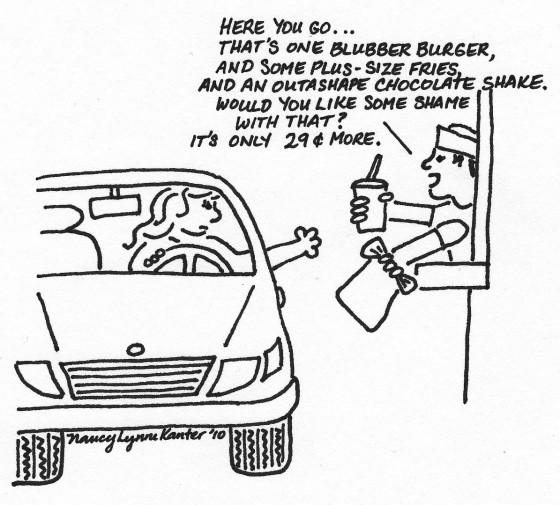
© 2010 Nancy Lynne Kanter
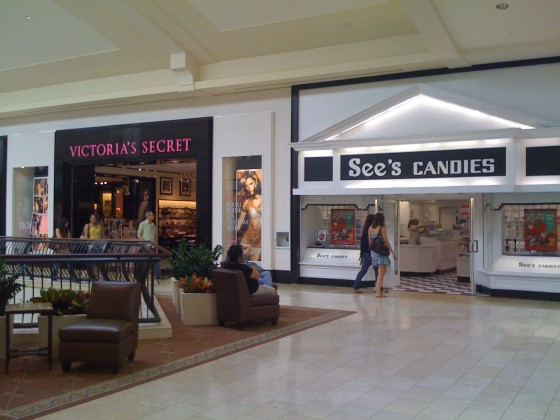
“[This is] about women who will prowl over 30 stores in 6 malls to find the right cocktail dress, but who haven’t a clue how to find fulfillment or how to wear joy …”
